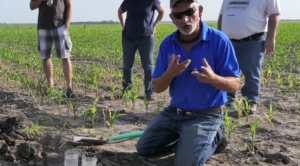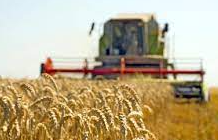A net used to trap insects on Bob Bacon’s farm in Hutchinson was used as part of a regenerative farming study.
Farmers participating in a project with the Ecosystem Services Market Consortium, General Mills and Kansas Department of Health and Environment are receiving payments this month for the environmental impacts of their regenerative agricultural practice changes.
The wheat farmers are part of a 2020 ESMC pilot project designed to pay farmers for the quantified and verified climate and water quality benefits of their practice changes in the Cheney Reservoir. Although the reservoir serves Sedgwick County, the farmers come from Kingman, Reno, Edwards, and Kiowa counties. 
The Kansas project is one of more than 10 projects that ESMC launched to test and refine its voluntary market program prior to a full launch next year. The pilots test ESMC’s processes for asset quantification, verification and certification and sales. By working collaboratively, all three organizations and their partners are demonstrating how agricultural solutions can deliver results that meet corporate and constituent demand as well as that of local public water authorities.
This pilot was open to producers participating in General Mill’s regenerative agriculture program. The project measured and modeled beneficial impacts from agricultural production system changes. As part of ESMC’s market program, the verified impacts allow the benefits to be claimed by corporations in the agricultural supply chain who invested in interventions to reduce their supply chain impacts. General Mills is utilizing the greenhouse gas reductions in their sustainability reporting, while KDHE is identifying local buyers who seek certified water quality outcomes.
“The ‘ecosystem practices’ are the same ones that are promoted for soil health – keep the soil covered, living roots year-round, reduce disturbance (chemical and tillage), increase crop diversity, and incorporate livestock into the cropping system,” said Lisa French, the project coordinator for Cheney Lake Watershed. “These are the practices that hold soil in place, build soil structure, increase infiltration and increase water holding capacity of soils.


